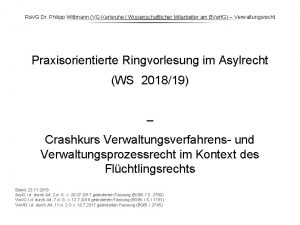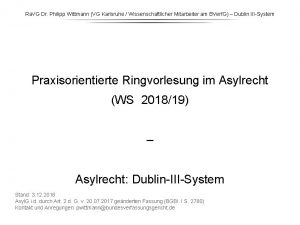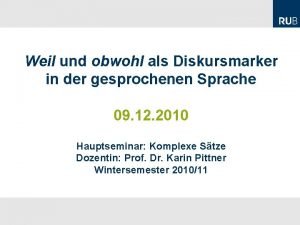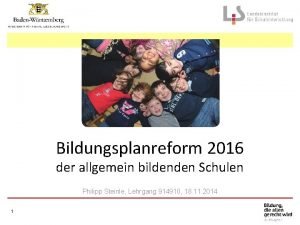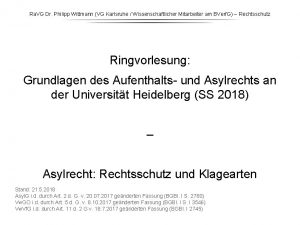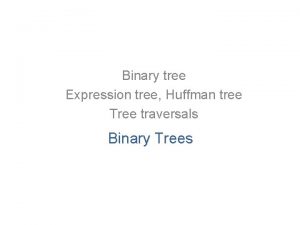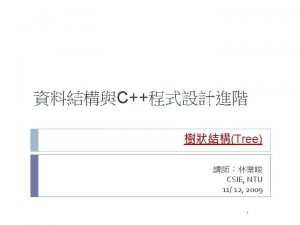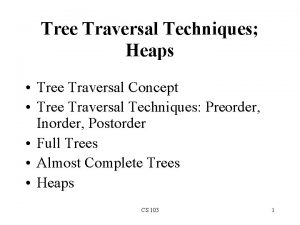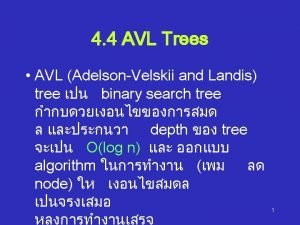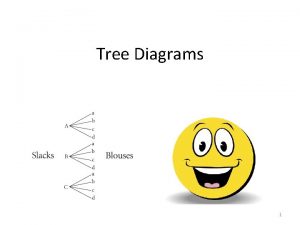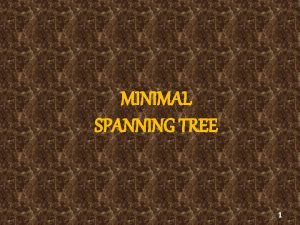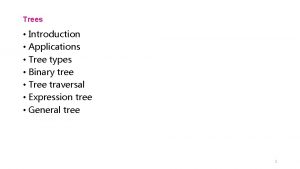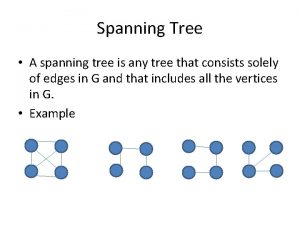Philipp Chapkovski European University Institute Advanced o Tree













![Moving choices to constants class Constants(Base. Constants): POLITICAL_CHOICES = [(0, 'Left'), (1, 'Right')] GENDER_CHOICES Moving choices to constants class Constants(Base. Constants): POLITICAL_CHOICES = [(0, 'Left'), (1, 'Right')] GENDER_CHOICES](https://slidetodoc.com/presentation_image_h2/5475fdd4334e802dd3b7a0c64c17e7b7/image-14.jpg)

![Treatments • class Constants(Base. Constants): treatments = ['T 1', 'T 2'] splitting_round = 3 Treatments • class Constants(Base. Constants): treatments = ['T 1', 'T 2'] splitting_round = 3](https://slidetodoc.com/presentation_image_h2/5475fdd4334e802dd3b7a0c64c17e7b7/image-16.jpg)


![Page refactoring: now • in Constants: • decision_order = {'T 1': ['sender', 'receiver'], • Page refactoring: now • in Constants: • decision_order = {'T 1': ['sender', 'receiver'], •](https://slidetodoc.com/presentation_image_h2/5475fdd4334e802dd3b7a0c64c17e7b7/image-19.jpg)

![Question randomization class Constants(Base. Constants): qs_a = ['political_views', 'trust'] qs_b = ['experimenter_demand', 'gender'] question_sets Question randomization class Constants(Base. Constants): qs_a = ['political_views', 'trust'] qs_b = ['experimenter_demand', 'gender'] question_sets](https://slidetodoc.com/presentation_image_h2/5475fdd4334e802dd3b7a0c64c17e7b7/image-21.jpg)
![Question randomization class Survey 1(Survey. Page): def get_form_fields(self): return json. loads(self. player. qs_order)[0] class Question randomization class Survey 1(Survey. Page): def get_form_fields(self): return json. loads(self. player. qs_order)[0] class](https://slidetodoc.com/presentation_image_h2/5475fdd4334e802dd3b7a0c64c17e7b7/image-22.jpg)


- Slides: 24

Philipp Chapkovski European University Institute Advanced o. Tree University of Mainz June 4 -5, 2018 Custom models - Introduction

4 -5 June 2018: Program outline 1. 2. 3. 4. 5. Refactoring inefficient code (Trust game) Writing PGG with punishment (PGGFG) Re-writing PGGFG using custom models Adding Real Effort Task (RET) into PGGFG Discussing individual projects

Two competing principles - DRY: Do not repeat yourself. - Premature optimization is the root of all evil. (Donald Knuth)

Recent changes in 2. 1. 5 • {% if a|default: None %} {{ a }} {% endif %}

Trust game with shifting order • Standard Trust game • Two treatments: • T 1: Sender makes the decision first; Receiver responds • T 2: Receiver makes the decision first (in %); Sender observes and responds • In the end we eliciting experimenter demand by randomizing questions order • Within-subject design: 2 rounds T 1; 2 Rounds T 2; and vice versa. • Each page has an info that study is conducted by the Uni of Mainz

Screen 1

Screen 2

Survey page 1

Survey page 2

Clean inefficiencies and errors Your task: • Find and clean as many inefficiencies as you can https: //github. com/chapkovski/mainz_task

Page sequence and order of class declarion • Results: - restore the order in page sequence •

Class inheritance class First. Page(Page): def is_displayed(self): return self. round_number == 1 class Survey. Page(Page): form_model = 'player' def is_displayed(self): return self. round_number == Constants. num_rounds class Intro 1(First. Page): . . . class Intro 2(First. Page): def is_displayed(self): return super(). is_displayed() and player. role()==‘A’ class Control. Questions 1(First. Page): . . .

Always use constants • class Constants(Base. Constants): name_in_url = 'solution_app' players_per_group = 2 num_rounds = 4 endowment = 100 multiplier = 2 • sender_decision = models. Integer. Field(max=Constants. endowment, …
![Moving choices to constants class ConstantsBase Constants POLITICALCHOICES 0 Left 1 Right GENDERCHOICES Moving choices to constants class Constants(Base. Constants): POLITICAL_CHOICES = [(0, 'Left'), (1, 'Right')] GENDER_CHOICES](https://slidetodoc.com/presentation_image_h2/5475fdd4334e802dd3b7a0c64c17e7b7/image-14.jpg)
Moving choices to constants class Constants(Base. Constants): POLITICAL_CHOICES = [(0, 'Left'), (1, 'Right')] GENDER_CHOICES = [(0, 'Female'), (1, 'Male')] TRUST_CHOICES = [ (0, 'You can trust most people. '), (1, 'You can never be too careful with others. '), ] trust = models. Integer. Field(choices=Constants. TRUST_CHOICES) • Why? because then we can reuse these choices elsewhere • ATTN: use get_FOO_display()

Minor things • always import at the top of the file • return only once if it makes sense (in vars_for_template in class Decision 4(Page): Decision 2) class Survey 1(Page): def get_form_fields(self): import random rand = random() if rand <. 5: random. shuffle(a) return a else: random. shuffle(b) return b def vars_for_template(self): … if curtreatment == 'T 1': … return { 'decision_text': decision_text, 'belief_text': belief_text, } else: … return { 'decision_text': decision_text, 'belief_text': belief_text,
![Treatments class ConstantsBase Constants treatments T 1 T 2 splittinground 3 Treatments • class Constants(Base. Constants): treatments = ['T 1', 'T 2'] splitting_round = 3](https://slidetodoc.com/presentation_image_h2/5475fdd4334e802dd3b7a0c64c17e7b7/image-16.jpg)
Treatments • class Constants(Base. Constants): treatments = ['T 1', 'T 2'] splitting_round = 3 why do I use assert? why we need config. get? why do I put treatment in to a group class Subsession(Base. Subsession): def creating_session(self): treatment_seq = self. session. config. get('treatment_seq', Constants. treatments) assert set(treatment_seq ). issubset(Constants. treatments) for g in self. get_groups(): if self. round_number < Constants. splitting_round: g. treatment = treatment_seq[0] else: g. treatment = treatment_seq[1] class Group(Base. Group): treatment = models. String. Field()

Calculate payoffs at the waitpage • BEFORE: class Results(Page): def is_displayed(self): if self. player. role() == 'sender': receiver = self. group. get_player_by_role('receiver') self. player. payoff = 100 - self. player. sender_decision + receiver_decision / 100 * self. player. sender_decision else: sender = self. group. get_player_by_role('sender') self. player. payoff = sender_decision * 2 - self. player. receiver_decision / 100 * sender_decision * 2 return True • AFTER: class Results. Wait. Page(Wait. Page): def after_all_players_arrive(self): self. group. set_payoffs() Why?

Page refactoring • Before we had 4 decision pages that look like that: class Decision 3(Page): form_model = 'player' def is_displayed(self): treatmentseq = self. session. config['treatment_seq'] curtreatment = treatmentseq[self. round_number - 1] if curtreatment == 'T 1': return self. player. role() == 'receiver' else: return self. player. role() == 'sender' def get_form_fields(self): treatmentseq = self. session. config['treatment_seq'] curtreatment = treatmentseq[self. round_number - 1] if curtreatment == 'T 1': return ['receiver_beliefs'] else: return ['sender_beliefs']
![Page refactoring now in Constants decisionorder T 1 sender receiver Page refactoring: now • in Constants: • decision_order = {'T 1': ['sender', 'receiver'], •](https://slidetodoc.com/presentation_image_h2/5475fdd4334e802dd3b7a0c64c17e7b7/image-19.jpg)
Page refactoring: now • in Constants: • decision_order = {'T 1': ['sender', 'receiver'], • 'T 2': ['receiver', 'sender']} class Decision_1(Decision. Belief): own_field = 'decision' class Belief_1(Decision. Belief): own_field = 'beliefs' class Belief_2(Decision. Belief): own_field = 'beliefs' class Decision_2(Decision. Belief): own_field = 'decision'

Universal page class Decision. Belief(Page): form_model = 'group' own_field = None def get_order(self): order = int(self. __class__. __name__. split('_')[1]) return int(order) - 1 def is_displayed(self): r = self. player. role() i = self. get_order() return self. player. role() == Constants. decision_order[self. group. treatment][i] def get_form_fields(self): return ['{}_{}'. format(self. player. role(), self. own_field), ]
![Question randomization class ConstantsBase Constants qsa politicalviews trust qsb experimenterdemand gender questionsets Question randomization class Constants(Base. Constants): qs_a = ['political_views', 'trust'] qs_b = ['experimenter_demand', 'gender'] question_sets](https://slidetodoc.com/presentation_image_h2/5475fdd4334e802dd3b7a0c64c17e7b7/image-21.jpg)
Question randomization class Constants(Base. Constants): qs_a = ['political_views', 'trust'] qs_b = ['experimenter_demand', 'gender'] question_sets = [qs_a, qs_b] class Subsession(Base. Subsession): def creating_session(self): if self. round_number == Constants. num_rounds: for p in self. get_players(): qs = Constants. question_sets. copy() for i in qs: random. shuffle(i) random. shuffle(qs) p. qs_order = json. dumps(qs)
![Question randomization class Survey 1Survey Page def getformfieldsself return json loadsself player qsorder0 class Question randomization class Survey 1(Survey. Page): def get_form_fields(self): return json. loads(self. player. qs_order)[0] class](https://slidetodoc.com/presentation_image_h2/5475fdd4334e802dd3b7a0c64c17e7b7/image-22.jpg)
Question randomization class Survey 1(Survey. Page): def get_form_fields(self): return json. loads(self. player. qs_order)[0] class Survey 2(Survey. Page): def get_form_fields(self): return json. loads(self. player. qs_order)[1]

Footer • moving footer to global • creating a Page. Ext in a _templates/global • within block content create another inner block called inner_content • move next button (wrapped in m-3 class – why? ) and include/footer to Page. Ext • replace all references from Page to Page. Ext in templates

solution: inheriting templates • {% extends "global/Page. html" %} {% load otree static %} {% block global_styles %} {% endblock %} {% block global_scripts %} {% endblock %} {% block content %} {% block inner_content %} {% endblock %} <div class="m-5"> {% next_button %} </div> {% include 'global/footer. html' %} {% endblock %} {% extends "global/Page. Ext. html" %} {% load otree static %} {% block title %} Intro 1 {% endblock %} {% block inner_content %} <div>Something here - intro</div> {% endblock %}
 Philipp chapkovski
Philipp chapkovski Otree devserver
Otree devserver Philipp chapkovski
Philipp chapkovski Wolfgang philipp
Wolfgang philipp European embedded control institute
European embedded control institute European astrobiology institute
European astrobiology institute European telecommunications standards institute
European telecommunications standards institute European institute for innovation and sustainability
European institute for innovation and sustainability Philipp gerke
Philipp gerke Dr. philipp wittmann
Dr. philipp wittmann Dr. philipp wittmann
Dr. philipp wittmann Dr. philipp wittmann
Dr. philipp wittmann Philipp dorok
Philipp dorok Fba10
Fba10 Suicide
Suicide Philipp steinle
Philipp steinle Philipp wilhelm grimm
Philipp wilhelm grimm Claudia philipp
Claudia philipp Philipp omenitsch
Philipp omenitsch Dr. philipp wittmann
Dr. philipp wittmann Philipp bertelsmeier
Philipp bertelsmeier Philipp thiessen
Philipp thiessen Z rotation
Z rotation Edi philipp
Edi philipp Interne verwaltungsdigitalisierung
Interne verwaltungsdigitalisierung










